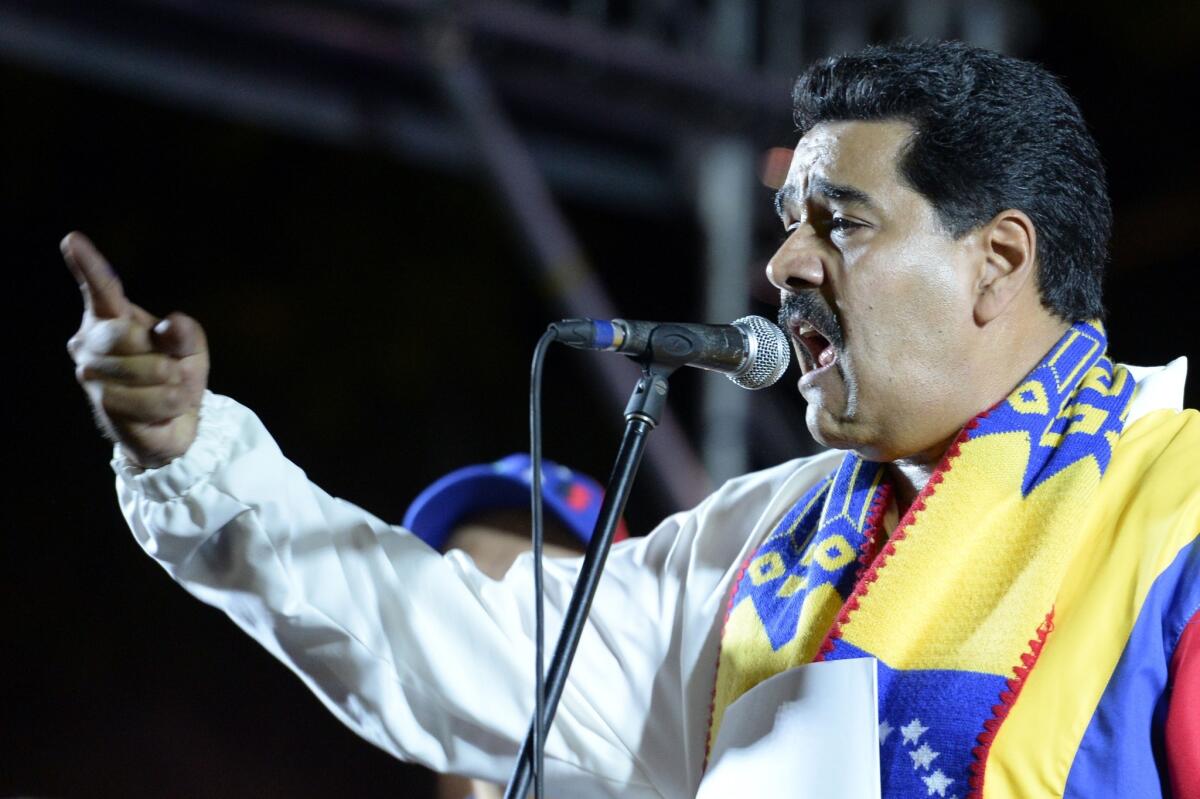Venezuela’s ruling socialists survive electoral test

CARACAS, Venezuela -- President Nicolas Maduro’s socialists captured a majority of the mayorships in contention in weekend elections, according to preliminary results, a significant victory that analysts say will give him the political backing he needs to make policy changes in the coming weeks.
The ruling party, known by its initials PSUV, and its allies won in 196 of the 335 municipalities nationwide, according to a bulletin issued by the National Electoral Council. The opposition Democratic Unity alliance and other political groupings took 61. Results for 78 others remained to be declared Monday.
A total of 59% of eligible voters took part in Sunday’s balloting with the PSUV capturing 49% of the vote compared with nearly 43% for the opposition.
Opposition members took solace in that they appeared to have won in Caracas, the capital, as well as other big cities, including Valencia and Maracaibo.
Sunday’s vote was the biggest electoral test yet for Maduro, the handpicked successor of the late Hugo Chavez, who died in March after 14 years in office.
Maduro was elected in April, narrowly beating opposition candidate Henrique Capriles, who is also the Miranda state governor. The PSUV and its allies controlled 265 city halls going into the vote.
‚ÄúI recognize the victory of the opposition in Caracas,‚ÄĚ Maduro said Sunday night. ‚ÄúBut the numbers of the NEC speak clearly of the force of the [socialist] Bolivarean revolution.‚ÄĚ
David Smilde, a sociology professor and Venezuela expert at the University of Georgia, said the results ‚Äúgive Maduro some breathing room.‚ÄĚ
‚ÄúConsidering where he was two months ago, with declining polls and headed to an electoral defeat, he was able to turn things around and overcome a significant obstacle,‚ÄĚ Smilde said. ‚ÄúHe is still not a strong president, but this should give him some capital over the coming months.‚ÄĚ
Smilde and others said Maduro faces tough decisions to tame a yawning budget deficit, the country’s 50% inflation rate and a faltering economy.
Many expect a devaluation of the bolivar by as much as 50%. The current official rate is 6.3 bolivars to the U.S dollar. But on the black market, a dollar fetches as many as 50 bolivars.
Few incidents were reported during Sunday’s vote. Turnout was said to be light to moderate in big cities such as Caracas and Maracaibo.
‚ÄúThis vote is proof of my loyalty to Chavez, but it bothers me that people aren‚Äôt coming out to vote,‚ÄĚ said civil service employee Nidia Rodriguez after voting in the blue-collar La Pastora barrio of Caracas. ‚ÄúNicolas needs our votes now more than ever.‚ÄĚ
Although Maduro’s term runs through early 2019, and the PSUV has a firm majority of seats in the National Assembly, a weak showing in the local elections would have encouraged opposition backers to push for a national recall referendum like the one in 2004 that sought unsuccessfully to unseat Chavez.
Opposition candidates had hoped to capitalize on public disaffection, a poor economy and ongoing scarcities of basic foodstuffs. Capriles tried to galvanize the disaffection by campaigning across the country for mayoral candidates from his Democratic Unity coalition.
‚ÄúI came to vote to express my disgust with all that is happening, the expensive cost of living, insecurity and the arbitrariness of a government that doesn‚Äôt respect the rights of its citizens,‚ÄĚ said store owner Maria Gutierrez after voting in the El Valle section of the capital.
At a news conference Sunday afternoon, Maduro promised to respect the voting tallies.
‚ÄúIf we win a mayorship by one vote, we accept it, and if we lose one by one vote, we accept it,‚ÄĚ Maduro said. ‚ÄúEveryone must respect the [voters‚Äô] decision.‚ÄĚ
The vote was the first since the government took effective control of Globovision, the last opposition TV station, a takeover that meant anti-PSUV candidates were given little news coverage.
Last month, Maduro ordered the armed forces to take over an electronics and appliance chain and to sell the inventory at half price, part of his plan to ‚Äúprohibit inflation.‚ÄĚ The move came as scarcity of dollars caused their value to skyrocket on the unofficial dollar exchange market, a rate many retailers use as a reference to mark up prices.
In the days before the election, the government continued to raid retailers and confiscate the inventories of those it claimed had broken pricing guidelines. Last month, the government announced agreements with Samsung, LG and other manufacturers to assemble goods in Venezuela and sell them at government-sanctioned prices.
On Monday, parts of Caracas and other cities were hit with a power outage, which Maduro, as has been his custom, blamed on opposition ‚Äúsabotage.‚ÄĚ Critics have said the power grid is crumbling because of insufficient government investment.
‚ÄúThe country has a lot of problems, and I don‚Äôt see a way out,‚ÄĚ Jorge Garcia, a motorcycle deliveryman, said Sunday. ‚ÄúBut the government has helped the poor a lot, and so we have a responsibility to vote for Nicolas‚Äô candidates. We can‚Äôt take a step back in this revolution.‚ÄĚ
ALSO:
North Korean ouster could bring more political turmoil
Muslim Brotherhood leader Badie brought before Egyptian court
Israel’s Benjamin Netanyahu to skip Mandela memorial, citing cost
Special correspondents Mogollon reported from Caracas and Kraul from Porto Alegre, Brazil.
More to Read
Sign up for Essential California
The most important California stories and recommendations in your inbox every morning.
You may occasionally receive promotional content from the Los Angeles Times.










